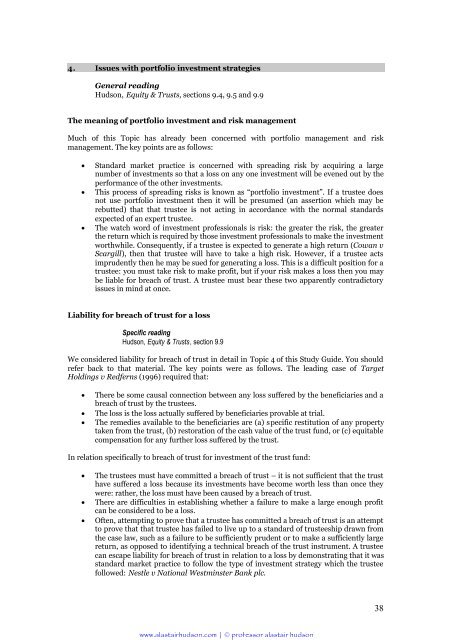Advanced Equity and Trusts Law - alastairhudson.com
Advanced Equity and Trusts Law - alastairhudson.com
Advanced Equity and Trusts Law - alastairhudson.com
Create successful ePaper yourself
Turn your PDF publications into a flip-book with our unique Google optimized e-Paper software.
4. Issues with portfolio investment strategies<br />
General reading<br />
Hudson, <strong>Equity</strong> & <strong>Trusts</strong>, sections 9.4, 9.5 <strong>and</strong> 9.9<br />
The meaning of portfolio investment <strong>and</strong> risk management<br />
Much of this Topic has already been concerned with portfolio management <strong>and</strong> risk<br />
management. The key points are as follows:<br />
� St<strong>and</strong>ard market practice is concerned with spreading risk by acquiring a large<br />
number of investments so that a loss on any one investment will be evened out by the<br />
performance of the other investments.<br />
� This process of spreading risks is known as “portfolio investment”. If a trustee does<br />
not use portfolio investment then it will be presumed (an assertion which may be<br />
rebutted) that that trustee is not acting in accordance with the normal st<strong>and</strong>ards<br />
expected of an expert trustee.<br />
� The watch word of investment professionals is risk: the greater the risk, the greater<br />
the return which is required by those investment professionals to make the investment<br />
worthwhile. Consequently, if a trustee is expected to generate a high return (Cowan v<br />
Scargill), then that trustee will have to take a high risk. However, if a trustee acts<br />
imprudently then he may be sued for generating a loss. This is a difficult position for a<br />
trustee: you must take risk to make profit, but if your risk makes a loss then you may<br />
be liable for breach of trust. A trustee must bear these two apparently contradictory<br />
issues in mind at once.<br />
Liability for breach of trust for a loss<br />
Specific reading<br />
Hudson, <strong>Equity</strong> & <strong>Trusts</strong>, section 9.9<br />
We considered liability for breach of trust in detail in Topic 4 of this Study Guide. You should<br />
refer back to that material. The key points were as follows. The leading case of Target<br />
Holdings v Redferns (1996) required that:<br />
� There be some causal connection between any loss suffered by the beneficiaries <strong>and</strong> a<br />
breach of trust by the trustees.<br />
� The loss is the loss actually suffered by beneficiaries provable at trial.<br />
� The remedies available to the beneficiaries are (a) specific restitution of any property<br />
taken from the trust, (b) restoration of the cash value of the trust fund, or (c) equitable<br />
<strong>com</strong>pensation for any further loss suffered by the trust.<br />
In relation specifically to breach of trust for investment of the trust fund:<br />
� The trustees must have <strong>com</strong>mitted a breach of trust – it is not sufficient that the trust<br />
have suffered a loss because its investments have be<strong>com</strong>e worth less than once they<br />
were: rather, the loss must have been caused by a breach of trust.<br />
� There are difficulties in establishing whether a failure to make a large enough profit<br />
can be considered to be a loss.<br />
� Often, attempting to prove that a trustee has <strong>com</strong>mitted a breach of trust is an attempt<br />
to prove that that trustee has failed to live up to a st<strong>and</strong>ard of trusteeship drawn from<br />
the case law, such as a failure to be sufficiently prudent or to make a sufficiently large<br />
return, as opposed to identifying a technical breach of the trust instrument. A trustee<br />
can escape liability for breach of trust in relation to a loss by demonstrating that it was<br />
st<strong>and</strong>ard market practice to follow the type of investment strategy which the trustee<br />
followed: Nestle v National Westminster Bank plc.<br />
www.<strong>alastairhudson</strong>.<strong>com</strong> | © professor alastair hudson<br />
38













